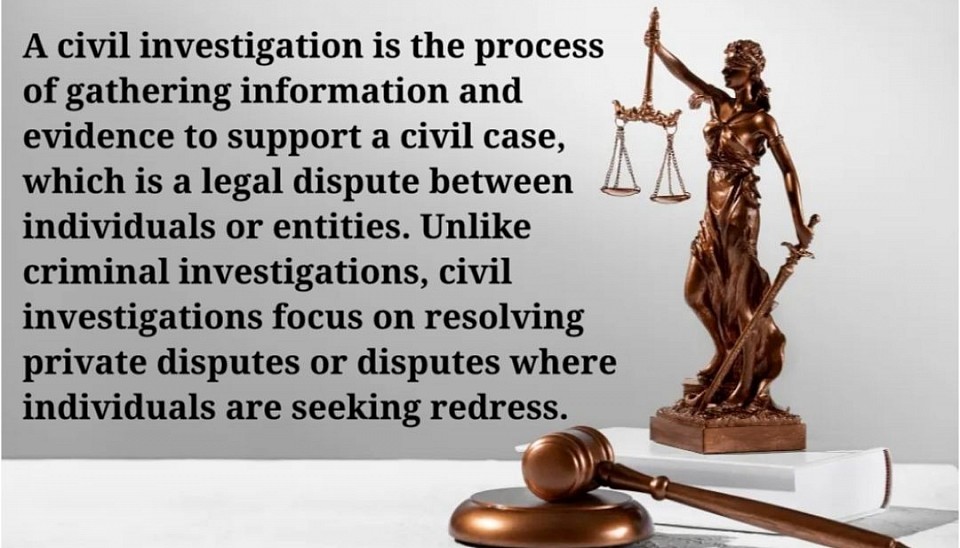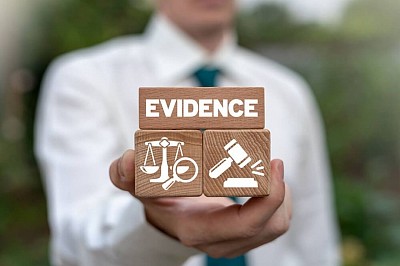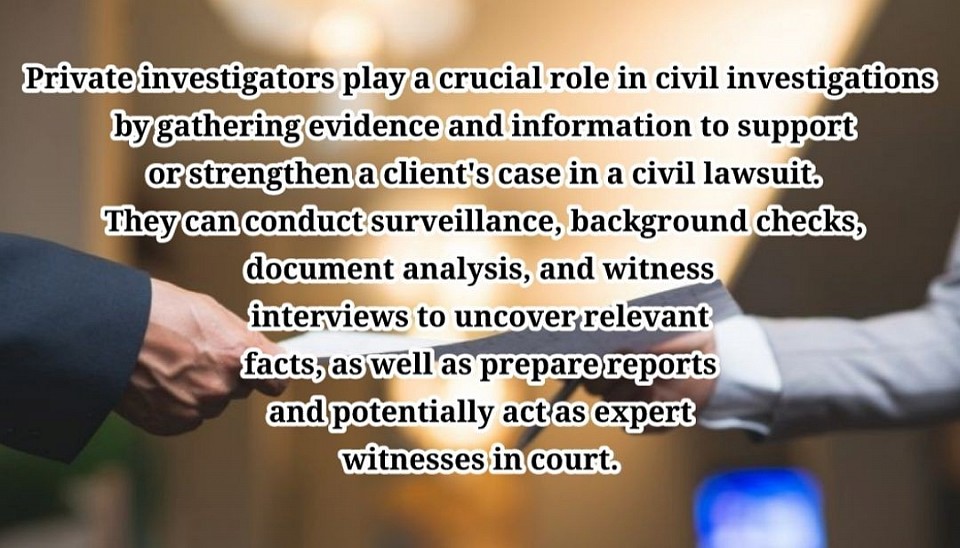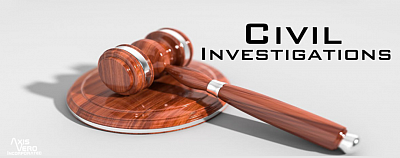Civil Investigations
Key aspects of civil investigations:
• Purpose:
To uncover and assemble information needed for a civil trial, which is often related to a dispute between citizens regarding their rights.
• Focus:
Civil investigations aim to gather evidence that will be presented in court to support the plaintiff's (the person bringing the lawsuit) claim.
• Examples:
Civil investigations can involve cases like lawsuits, property disputes, debt collection, and contract disputes.
• Methods:
Civil investigators may use various techniques, including research, background checks, surveillance, and forensic analysis to gather evidence.
• Difference from criminal investigations:
Civil investigations do not involve the investigation of crimes and are not conducted by law enforcement agencies.
• Standard of Proof:
In civil cases, the plaintiff must prove their case by a "preponderance of the evidence" (more than 50 percent), as opposed to the "beyond a reasonable doubt" standard in criminal cases.
How Private Investigators Assist in Civil Cases:
• Evidence Gathering:
They use various methods to gather evidence, including surveillance, background checks, and forensic investigations.
• Document Analysis:
They can review and analyze documents to identify inconsistencies or relevant information.
• Witness Interviews:
They can interview witnesses to obtain information and gather their accounts of events.
• Surveillance:
They can conduct surveillance to gather information on individuals, their activities, and their whereabouts.
• Expert Witness Testimony:
In some cases, they can provide expert testimony in court, sharing their findings and insights.
• Report Preparation:
They can create detailed reports summarizing their findings and evidence for the client.
Types of Civil Cases where Private Investigators are Used:
• Divorce and Child Custody:
They can gather evidence related to financial records, relationships, and the well-being of children.
• Personal Injury Cases:
They can investigate the circumstances of an accident and gather evidence to support a client's claim.
• Employment Disputes:
They can investigate allegations of harassment, discrimination, or other workplace issues.
• Contract Disputes:
They can investigate allegations of breach of contract and gather evidence to support a claim.
• Fraud and Misappropriation:
They can investigate cases of fraud and help recover losses.
• Family Disputes:
Investigating child abuse, elder abuse, or domestic violence to gather evidence for legal proceedings.
• Asset Tracing:
Identifying and locating assets to support legal claims or disputes.
• Skiptrace:
Locating individuals who are evading legal processes or are difficult to find.
• Due Diligence:
Conducting thorough investigations to verify the background and reputation of individuals or businesses.
Key Considerations:
• Cost:
Hiring a private investigator can be expensive, so it's important to carefully consider the need for their services.
• Ethics:
It's important to hire a reputable and ethical investigator who adheres to legal and ethical guidelines.
• Confidentiality:
Private investigators are bound to maintain confidentiality and protect the privacy of their clients and the subjects of their investigations.
• Family Disputes:
Investigating child abuse, elder abuse, or domestic violence to gather evidence for legal proceedings.
• Asset Tracing:
Identifying and locating assets to support legal claims or disputes.
• Skiptrace:
Locating individuals who are evading legal processes or are difficult to find.
• Due Diligence:
Conducting thorough investigations to verify the background and reputation of individuals or businesse






